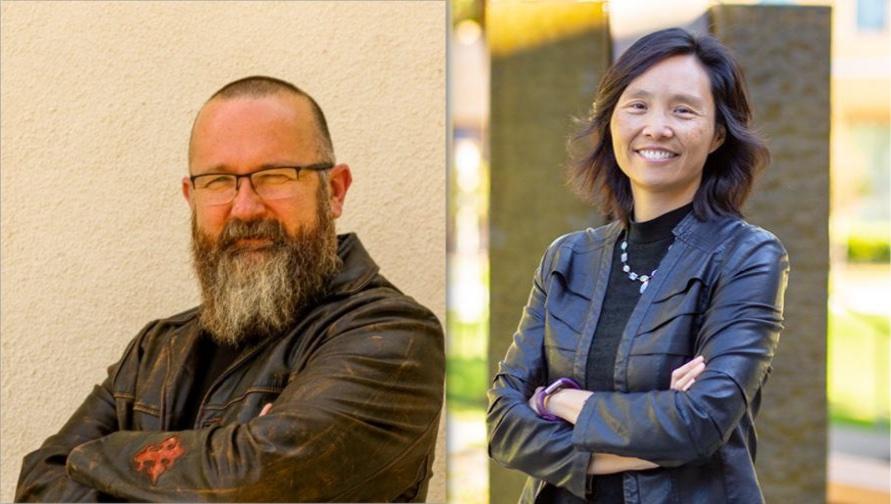
By Megan Cole
From ancient Greek philosophical texts to contemporary blockbusters like The Matrix (1999), humans across millennia have fantasized about utopias and dystopias (ideally good and ideally bad worlds) to help them understand the actual worlds in which they live.
This fall, more than 800 students taking UCI’s Humanities Core – a yearlong seminar designed for freshmen – have been exploring this long tradition through the course’s new theme, “Worldbuilding.”
According to Humanities Core Director Jonathan Alexander, “worldbuilding” is a concept that addresses how people use art and cultural production to refashion their environments into something more equitable and sustainable. For Alexander, the theme “seemed particularly relevant for today’s students.”
“The humanities offer a rich array of creative and critical possibilities not just for interpreting the world as we know it but for reimagining it,” says Alexander, who is also a Chancellor’s Professor of English and informatics. “Given the contemporary troubles of our world, from political unrest to climate change, imagining different worlds – more socially and ecologically just worlds – seems a good place to start.”
This year, Humanities Core students are “experimenting with worldbuilding” across an intensive three quarters of study, covering seven general education requirements in the process. Discussions and lectures are facilitated by faculty from nine humanities departments: classics, history, film and media studies, European languages and studies, English, art history, African American studies, philosophy and Asian American studies.
During fall quarter, Associate Professor of Classics Zina Giannopoulou has lectured on Plato’s Republic, an ancient Greek text that envisions how a perfect society might be run, while connecting it to the classic 1999 sci-fi dystopia The Matrix. In the winter, African American Studies and Art History Professor Bridget Cooks will deliver lectures on how African American artists have used worldbuilding to survive and contest racist societies. Later in the winter quarter, Associate Professor of Film and Media Studies Bo Ruberg will lecture on how virtual and computerized worlds offer a very contemporary form of complex worldbuilding.
The goal of Humanities Core’s disciplinary breadth, for Alexander, is to “put students in touch with some of the best minds in the country working on issues in the humanities,” as well as to “provide them an opportunity to contribute their own thoughts about some of the most pressing and interesting questions facing our species and our planet today.”
To that end, Humanities Core assignments are not limited to the traditional research paper. Over the course of the academic year, students will not only write a range of textual analyses, but as their “capstone” project, will compile a multimedia digital archive that includes film clips, sounds, images and text.
These multimodal archives will represent the “ever-evolving repository of students’ thoughts and creative engagement with course materials,” Alexander says. Humanities Core faculty hope that these student-made archives will demonstrate how “art, speculative narrative, film and media, including video and computer games […] are all ways in which we experiment with worldbuilding, with imagining the world differently than the way it is given to us.”
To complement Humanities Core’s engagement with worldbuilding this year, UCI’s Humanities Center has chosen “Worldmaking through Embodiment” as its annual theme. For Judy Wu, director of the Humanities Center, worldmaking and worldbuilding are particularly important concepts to explore “after what we have collectively experienced in the last several years.”
“We are living in a dystopian world,” she says. “So how might we imagine the world anew?”
To promote its “Worldmaking through Embodiment” theme, each quarter this academic year, the Humanities Center is co-sponsoring an artist in residence at UCI. This fall, Gerald Casel, an internationally renowned choreographer of Filipinx background, is hosting a series of dance-focused events. He hopes that attendees “will be encouraged to develop an embodied manifesto that aligns ongoing, lasting actions with values of equity and absolute belonging.”
Whether in the Humanities Core classroom or at the Humanities Center’s community events, Alexander and Wu each hope that students will come to understand “worldbuilding” not only as a form of escape, but as an opportunity for reinvention.
“I hope that members of the UCI community and those in the broader community are inspired to join us, to learn, to experience and to perhaps see the world anew from these cultural encounters,” says Wu. “Through worldbuilding, I hope they gain a greater appreciation of the capacities of our bodies and minds to invent and connect."
